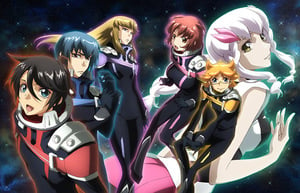Review
by Rebecca Silverman,Majestic Prince
| Synopsis: |  |
||
As Team Rabbits learns better to work together and master their mechs, new emotional strengths and weaknesses are uncovered. Their battles become more high-stakes and they meet other mecha pilots, but none of this seems to decrease their value as propaganda for the military, a situation that Kei at least continues to have mixed feelings about. When Izuru finally comes face to face with one of the Wulgaru, however, is when things really begin to change for the group. What is this war they're fighting? And was it really worth the cost of their former lives and families? |
|||
| Review: | |||
Majestic Prince may have started out as a fairly cookie-cutter mecha show, but by this halfway point in its run, it has proven that it has something that sets it apart from its brethren – Majestic Prince has a lot of heart. This is not to say that other shows in the genre do not, but the attention to the more subtle aspects of family life and how the five protagonists deal with its lack is really quite beautiful to behold. The members of Team Rabbits have gone from stereotypes in color-coded suits to real people, and even had the plot not improved, this would be enough to elevate Majestic Prince from its previous standing of, “Well, it's something to watch on Thursdays.” Now that the members of Team Rabbits have graduated from the military academy, they are able to be treated like full-fledged soldiers, and episode seven spends some time exploring that. Interestingly enough, this is secondary to the episode's main plot about the Wulgaru, but by just giving us glimpses of the changes in the teens' lives rather than spending an entire twenty-five minutes poring over details the impact is heightened. Everyone now has his or her own suite, hangar, and pit crew, which clearly overwhelms and impresses them, but nothing brings home their discomfort and amazement like having them all still congregate in one of the rooms. This is done with very little commentary, and the fact that it is difficult to tell whose suite they are hanging out in helps to highlight the fact that they are not comfortable with the idea of having their own spaces to personalize. It's a little bit sad, but highly effective. Perhaps the biggest change in this set of episodes is the way the Wulgaru are brought to the fore. Previously we alone knew what these aliens looked like, and Izuru's encounter with Jiart, Prince of the Wulgaru, has some repercussions for the self-proclaimed hero. He also learns the identity of the mysterious violet-haired girl who he glimpsed at a resort in an earlier episode, which also makes him question his role and how he got to where he is. At this point she remains the sort of enigmatic pretty girl, but her past will likely come to have a bigger impact on the plot as the story goes on. She also serves to move the potential romantic subplot along by giving us an inkling that Kei might have feelings for Izuru; as of now, however, that's all we get. Really the strongest feature of this second set of episodes is the slow growth of the characters. They are simultaneously childlike and grown up, a contradiction that is used to good effect as they work to control the JURIA system. Tamaki remains the most one-note of all of the characters, obsessed with hot guys and pickled fish guts over rice and just generally coming off as kind of annoying. She does pull her weight in the battles, however, so she can't be written off as the genki fanservice character; she just lacks the depth of Izuru or Kei. Those two get the most development, and even the twelfth episode, which might be either filler or the calm before the storm, takes her and develops a facet of her personality. Episode twelve also does a good job of showing us Izuru's childlike side as he bops around the station looking for someone to show his manga to, and Toshikazu's patience and kindness is highlighted in his section of the episode. Animation continues to be great when fully done and mediocre when shortcuts are taken to excess, which gives the show a sort of teeter-totter sensation from moment to moment. The most glaring character design issue remains Tamaki's expanding/shrinking/generally overdone chest, which at times seems to resize from shot to shot. At a quick look it is sometimes difficult to tell Izuru and Toshikazu apart if they aren't in their machines, but overall the visuals remain consistent with the first part of the series. This segment features a nice vocal surprise in Nao Tōyama's Peko, who really steals the show a couple of times. As Majestic Prince heads into its second half, viewers who were underwhelmed at first but stuck with it should be congratulating themselves. It has morphed from a very basic mecha tale to one that seems to be going places, and if it still isn't always as fast moving or consistently fascinating as it could be, it certainly is trying its hardest. “Heart” may be an overused term, but Majestic Prince has it in spades as it continues to probe the problems of its world and to develop its protagonists, and that alone is really worth watching. |
| Grade: | |||
|
Overall (sub) : B
Story : B
Animation : C+
Art : C
Music : B
+ Good character development, tugs at the heartstrings at times. Combines several sci fi tropes to good effect. |
|||
| discuss this in the forum (16 posts) | | |||
| Production Info: | ||
|
Full encyclopedia details about |
||